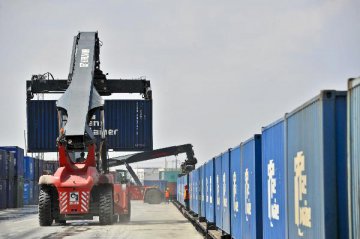
China has signed tax treaties with 54 countries along the “Belt and Road” initiatives.
A total of 13.18 billion yuan of repeated taxes have been eliminated in three years, benefiting the “going out” and “bringing into”.
Tax treaties are known as the “amulet” of enterprises “going out”. The Economic Information Daily learnt from the State Administration of Taxation (SAT) that as at the end of April 2017, China has signed 106 bilateral tax treaties, arrangements and agreements with 116 countries and regions, 54 of which are along the “Belt and Road”. It forms the third biggest tax treaty network in the world, covering most of China’s major investment destinations. It has eliminated a total of 13.18 billion yuan of international repeated taxes through bilateral negotiation in three years. Experts pointed out that on the one hand, the implementation of tax treaties can promote Chinese enterprises “going out”; on the other hand, it will facilitate enterprises from countries along the “Belt and Road” “bringing in” and enjoying relevant preferential taxation policies.
Troubles Taxation discrimination and disputes prevent enterprises “going out”
As more and more Chinese enterprise “go out”, Chinese enterprises are facing more and more taxation risks in overseas countries. Statistics show that taxation discrimination and disputes bring up to tens of billions of yuan losses to Chinese enterprises “going out” every year.
As a leader in the domestic sheet glass industry, Kibing Glass Co., Ltd. takes the opportunity of the Belt and Road initiatives and invested 1.17 billion yuan in Malaysia to establish two glass production lines, which are expected to record an annual average profit of 150 million yuan, Cao Yuchang, general manager of the Zhangzhou-based company indicated.
“We encountered various changes when making overseas investments. We were required to pay withhold income tax on interest, which confused us as it is different from the policies we learnt previously.” Cao indicated. The company has conducted deep research on local raw materials cost, market background, international marketing and logistics. However, there are still blind areas in local taxation policies and the company faced many problems in the implementation of projects. Cao voiced the problems faced by most enterprises “going out”.
Subsequently, through the negotiation between Chinese taxation authorities and the counterparties, the two parties signed supplementary clauses on the tax treaties. A total tax of 34 million yuan has been eliminated for this company.
Kibing Glass is just one of the enterprises facing taxation barriers when “go out”. As a matter of fact, experts point out that enterprises will be involved in taxation issues in all processes of “going out”. They mainly go out through overseas equity investments, overseas assets acquisition and projects contracting. Overseas equity investments involve income tax problems. The purchase of equipment involves tax rebates and physical items will see value-added taxes.
It is learnt that Chinese enterprises are facing increasingly diversified, complicated and professional taxation issues in cross-country operations. For example, many enterprises, small and medium enterprises in particular, have no systematic knowledge about overseas taxation systems. They are gradually subject to local taxation laws and suffer unnecessary economic losses. When they encounter taxation disputes in overseas operation, they cannot safeguard their own taxation interests through tax treaties and bilateral negotiation mechanisms between governments. For countries along the “Belt and Road” in particular, on the one hand, enterprises cannot reasonably judge and effectively control the taxation risks in “going out” due to their insufficient knowledge. On the other hand, some countries along the “Belt and Road” have insufficient taxation mechanisms.
Escort Over 100 agreements form globally third biggest agreement network
Tax treaties are known as the “amulet” of enterprises “going out”. Tax treaties are international treaties on cross-country and cross-border taxes, which can eliminate he double taxation in the host country and China and reduce the taxation cost of enterprises “going out”. As tax treaties prevail local laws and are not subject to the changes of local taxation laws, they can provide a certain taxation environment for enterprises “going out”. In addition, the taxation rate under tax treaties is generally lower than the taxation rate of the host country, it can help enterprises solve overseas taxation disputed through the negotiation mechanism under the treaties.
The statistics of the SAT show that China has sped up in signing tax treaties since the initiation of the “Belt and Road” initiatives. As at the end of April 017, China has signed 106 bilateral tax treaties, arrangements and agreements with 116 countries and regions, 54 of which are along the “Belt and Road”. It forms the third biggest tax treaty network in the world, covering most of China’s major investment destinations.
Statistics show that only the clause on agreed interest under tax treaties has saved 27.8 billion yuan for Chinese financial institutes in 2016, which greatly supported “capitals integration”. The two-way mutual benefit saved a tax of 28 billion yuan for overseas taxpayers. A total of 13.18 billion yuan of repeated taxes have been eliminated in three years through bilateral negotiation.
It should make full use of tax treaties to set taxation rates and provide solutions to the host country in setting the threshold for tax levies, offset provisos and settlement solutions for disputes. It will boost the taxation revenue of taxpayers. Taxpayers have to know the contents of the tax treaties without worrying out the changes of taxation policies in the host country. Enterprises will be confident to advance if they have such knowledge, indicated Hu Yijian, a professor at Shanghai University of Finance and Economics.
“Some enterprises “going out” are not familiar with the tax treaties and cannot make full use of the “non-discriminated treatment” and “mutual negotiation” to safeguard their own legitimate interests. It requires taxation authorities giving instructions to enterprises.” Tang Jiqiang, a professor at the Southwestern University of Finance and Economics, indicated.
Win-Win Bring in more enterprises from countries along the “Belt and Road”
Despite the increasingly complete international tax treaties network, the “asymmetric taxation information” will become the biggest bottleneck for the overseas development of enterprises. Stable and clear taxation policies and transparent and fair taxation environment are the most concerned taxation issue among taxpayers with cross-border operation. The signing of tax treaties can provide reliable taxation expectation to taxpayers with cross-border operation.
Dongguan Huajian Group is one of the pioneers with factories in Ethiopia. Huajian Group almost suffered from “asymmetric taxation information”. The taxation authorities in Ethiopia planned to levy taxes on the dividend of the enterprise at 10 percent. Dongguan Minicipal Office of the SAT assisted the enterprise and issued a letter to the financial department of Ethiopia immediately learning about the news. “According to the tax treaties between China and Ethiopia, the dividend tax shall be levied at 5 percent”. The financial department of Ethiopia finally recognized the effectiveness of the China-Ethiopia agreement and reduced 300,000 U.S. dollars for Huajian Group. The case reduced the taxation cost of Huajian Group and provided reference to Chinese enterprises in Ethiopia.
An official from the international taxation division of the SAT introduced that “The lack of knowledge about overseas taxation used to be a bottleneck in the “going out” of enterprises. As a result, the SAT has initiated the study on taxation of individual countries since 2015, covering 95 countries and regions along the “Belt and Road” and major investment destinations of Chinese enterprises. It has issued the taxation instructions on 59 countries and regions. Enterprise “going out” have their “dictionary” on overseas taxation issues.”
On the one hand, the implementation of tax treaties can promote Chinese enterprises “going out”; on the other hand, it will facilitate enterprises from countries along the “Belt and Road” “bringing in” and enjoying relevant preferential taxation policies.
A Chinese-foreign joint pharmaceutical venture in Shandong is a representative of enterprises “Bringing in” with preferential taxation treatment. Based on the tax treaty signed by China and the country as well as other arrangements provided in relevant regulations, the enterprises wanted to obtain certain taxation revenue in the production and operation in following years. Through the negotiation between the taxation authorities of both countries, they reached agreement on the pricing principles and calculation of connected transactions in following years and eliminated more than 10 million yuan of international repeated taxes. The enterprise became more confident and will make an additional investment of 150 million yuan in the construction of new projects in order to minimize the energy consumption and the emission of waste water and gas.
Translated by Star






















Latest comments